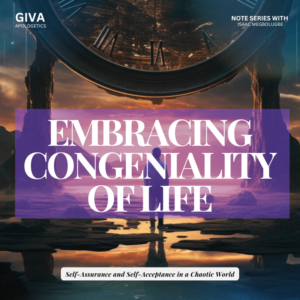
Embracing Congeniality of Life: Self-Assurance and Self-Acceptance in a Chaotic World
Isaac Megbolugbe
January 2, 2025
Introduction
As we navigate the complexities of life, it’s easy to lose sight of what truly matters. However, there’s a profound truth that can anchor us during life’s storms: embracing the congeniality of life is rooted in self-assurance and self-acceptance. In this article, we’ll explore the importance of self-assurance and self-acceptance in cultivating a more authentic, joyful, and fulfilling life.
Easy to Do Business With
Life is a complex tapestry of experiences, relationships, and choices. Amidst the chaos, it’s easy to lose sight of what truly matters. However, there’s a profound truth that can anchor us during life’s storms: congeniality, the confidence of life is rooted in self-assurance and self-acceptance. Becoming easy to do business with.
Self-Assurance: The Foundation of Inner Peace: Self-assurance is the unwavering trust in oneself, one’s abilities, and one’s worth. It’s the confidence that comes from knowing who you are, what you stand for, and what you want out of life. When you’re self-assured, you’re not easily swayed by the opinions of others or the whims of circumstance. You’re grounded in your own identity and purpose.
Self-Acceptance: The Key to Emotional Freedom: Self-acceptance is the unconditional love and acceptance of oneself, flaws and all. It’s the recognition that you’re imperfect, and that’s okay. When you accept yourself, you’re free from the need for external validation. You’re no longer held hostage by the fear of rejection or the desire for approval.
Embracing the Impermanence of Relationships: One of the most significant challenges to self-assurance and self-acceptance is the impermanence of relationships. Not everyone you love will stay, and not everyone you trust will be loyal. However, this doesn’t have to be a source of pain or anxiety. Instead, it can be an opportunity to practice self-assurance and self-acceptance.
When someone chooses to leave your life, it’s essential to accept their decision and let it go. Begging someone to stay or trying to convince them to love you can be damaging to your self-worth and emotional well-being. Instead, focus on nurturing your own self-assurance and self-acceptance.
Trusting Your Intuition and Energy: Another crucial aspect of self-assurance and self-acceptance is trusting your intuition and energy. When someone is not beingreal or genuine, you can feel it. Energy never lies, and your intuition is a powerful guide. Don’t be afraid to trust your instincts and speak your truth.
Following the Right Way, Not the Majority: In a world where conformity and people-pleasing are often encouraged, it’s essential to remember that following the majority is not always the right way. Instead, focus on following your heart, your intuition, and your values. When you stay true to yourself, you’ll attract people and experiences that align with your authentic self.
Conclusion: Embracing the congenital confidence of life requires self-assurance and self-acceptance. By trusting yourself, accepting your imperfections, and following your intuition, you’ll be able to navigate life’s challenges with greater ease and confidence. Remember, not everyone you love will stay, but that’s okay. You are enough, just as you are.
Maintaining Self–Assurance in Challenging Situations
Maintaining self-assurance in challenging situations requires a combination of mindset shifts, self-care practices, and intentional actions. Here are some strategies to help you cultivate and maintain self-assurance:
Mindset Shifts
1. Reframe negative self-talk: Challenge negative inner voices by reframing negative thoughts into positive, empowering ones.
2. Focus on strengths: Emphasize your strengths and accomplishments to boost confidence.
3. Practice self-compassion: Treat yourself with kindness, understanding, and patience, just as you would a close friend.
Self-Care Practices
1. Get enough sleep: Adequate rest helps regulate emotions and maintain confidence.
2. Exercise regularly: Physical activity releases endorphins, which enhance mood and self-assurance.
3. Meditate and practice mindfulness: Regular mindfulness practice helps calm the mind, reducing self-doubt and increasing self-awareness.
Intentional Actions
1. Set realistic goals and achieve them: Celebrate small wins to build momentum and confidence.
2. Seek supportive relationships: Surround yourself with positive, encouraging people who believe in you.
3. Take calculated risks: Step out of your comfort zone to challenge yourself and build resilience.
4. Practice assertive communication: Express your needs, wants, and boundaries clearly and respectfully.
5. Learn from failures and setbacks: Use mistakes as opportunities for growth, learning, and self-improvement.
6. Focus on the present moment: Concentrate on what you can control in the present, rather than worrying about the past or future.
Additional Tips
1. Develop a growth mindset: Believe that your abilities and intelligence can be developed through dedication and hard work.
2. Stay positive and focus on solutions: Concentrate on finding solutions rather than dwelling on problems.
3. Celebrate your successes: Acknowledge and celebrate your achievements to reinforce self-assurance.
By incorporating these strategies into your daily life, you’ll be better equipped to maintain self-assurance in challenging situations. Remember that self-assurance is a journey, and it’s okay to encounter setbacks along the way. With persistence, patience, and practice, you can develop the self-assurance needed to navigate life’s challenges with confidence.
Benefits of Self-Acceptance
The benefits of self-acceptance are numerous and transformative. Here are some of the most significant advantages of cultivating self-acceptance:
Emotional Benefits
1. Reduced self-criticism: Self-acceptance helps you develop a more compassionate and gentle relationship with yourself.
2. Increased self-esteem: Accepting yourself as you are boosts your confidence and self-worth.
3. Improved mental health: Self-acceptance is linked to lower levels of anxiety, depression, and stress.
Relational Benefits
1. Healthier relationships: When you accept yourself, you’re more likely to attract and maintain healthy, fulfilling relationships.
2. Improved communication: Self-acceptance helps you communicate more authentically and assertively.
3. Increased empathy: Accepting yourself allows you to be more understanding and compassionate towards others.
Personal Growth Benefits
1. Increased self-awareness: Self-acceptance helps you develop a deeper understanding of your thoughts, feelings, and behaviors.
2. Improved self-care: When you accept yourself, you’re more likely to prioritize your physical, emotional, and spiritual well-being.
3. Enhanced creativity: Self-acceptance can foster a more creative and innovative mindset.
Spiritual Benefits
1. Deeper connection with oneself: Self-acceptance can lead to a greater sense of connection with your inner self and your spiritual nature.
2. Increased sense of purpose: Accepting yourself can help you discover your passions and values, leading to a greater sense of purpose.
3. Greater sense of compassion: Self-acceptance can cultivate a more compassionate and loving attitude towards yourself and others.
Practical Benefits
1. Reduced people-pleasing: Self-acceptance helps you set healthy boundaries and prioritize your own needs.
2. Increased resilience: Accepting yourself can help you develop coping strategies and bounce back from adversity.
3. Improved decision-making: Self-acceptance can lead to more informed and authentic decision-making.
By embracing self-acceptance, you can experience these benefits and more, leading to a more fulfilling, authentic, and joyful life.
Developing Self-Awareness for Self-Acceptance
Developing self-awareness is a crucial step towards self-acceptance. Here are some strategies to help you cultivate self-awareness:
1. Mindfulness and Meditation
Practice mindfulness meditation to become more aware of your thoughts, emotions, and physical sensations. Regular mindfulness practice helps you develop a non-judgmental awareness of yourself.
2. Journaling
Write down your thoughts, feelings, and experiences in a journal. Reflecting on your journal entries can help you identify patterns, gain insights, and develop a better understanding of yourself.
3. Self-Reflection
Schedule regular time for self-reflection, asking yourself questions like:
– What are my strengths and weaknesses?
– What are my values and goals?
– What triggers my emotions, and how do I respond to them?
– What are my thought patterns, and how do they impact my behavior?
4. Seek Feedback
Ask trusted friends, family, or a therapist for their honest feedback about you. Be open to constructive criticism and use it as an opportunity to learn and grow.
5. Practice Self-Compassion
Treat yourself with kindness, understanding, and patience. Acknowledge that everyone makes mistakes and that it’s okay not to be perfect.
6. Engage in Self-Care
Take care of your physical, emotional, and mental well-being by getting enough sleep, exercising regularly, and engaging in activities that bring you joy and relaxation.
7. Learn to Recognize and Challenge Negative Self-Talk
Notice when you’re engaging in negative self-talk and challenge those thoughts by reframing them in a more positive and realistic light.
8. Develop Emotional Intelligence
Learn to recognize, understand, and manage your emotions. This will help you develop better relationships with yourself and others.
9. Practice Gratitude
Focus on the things you’re grateful for, rather than dwelling on negative thoughts or emotions. Practicing gratitude can help shift your perspective and increase self-awareness.
10. Seek Professional Help
If you’re struggling with self-awareness or self-acceptance, consider seeking help from a mental health professional. They can provide you with personalized guidance, support, and tools to help you develop greater self-awareness and self-acceptance. By incorporating these strategies into your daily life, you’ll be well on your way to developing greater self-awareness, which is essential for cultivating self-acceptance.
Some Self-Care Practices for Self-Acceptance
Here are some self-care practices that can help cultivate self-acceptance:
Mindfulness and Meditation
1. Loving-kindness meditation: Focus on sending kindness and compassion to yourself and others.
2. Body scan meditation: Practice accepting and loving your body as it is.
3. Mindful breathing: Focus on the present moment and let go of self-criticism.
Self-Reflection and Journaling
1. Gratitude journaling: Write down things you’re thankful for about yourself and your life.
2. Self-reflection prompts: Use guided questions to explore your thoughts, feelings, and behaviors.
3. Letter to yourself: Write a kind and compassionate letter to yourself, acknowledging your strengths and weaknesses.
Physical Self-Care
1. Self-care rituals: Establish routines that promote relaxation and self-love, such as baths, massages, or yoga.
2. Physical activity: Engage in exercise that brings you joy and helps you appreciate your body’s capabilities.
3. Healthy eating: Nourish your body with wholesome foods that promote well-being.
Creative Expression
1. Art therapy: Use creative expression to process emotions and promote self-acceptance.
2. Writing: Write poetry, stories, or affirmations that celebrate your uniqueness.
3. Music: Listen to or create music that uplifts and inspires you.
Social Connections
1. Supportive relationships: Surround yourself with people who accept and support you.
2. Self-acceptance groups: Join communities that focus on self-acceptance and self-love.
3. Therapy: Work with a therapist who can help you develop self-acceptance and self-compassion.
Affirmations and Positive Self-Talk
1. Daily affirmations: Repeat positive statements that promote self-acceptance and self-love.
2. Positive self-talk: Practice using kind and supportive language when speaking to yourself.
3. Mirror work: Use affirmations and positive self-talk while looking in the mirror to promote self-acceptance.
Remember, self-acceptance is a journey, and it’s essential to be patient and compassionate with yourself as you explore these practices.
Concluding Remarks
In conclusion, embracing the congeniality of life requires self-assurance and self-acceptance. By trusting yourself, accepting your imperfections, and following your intuition, you’ll be able to navigate life’s challenges with greater ease and confidence. Remember, self-assurance and self-acceptance are journeys, not destinations. Be patient, kind, and compassionate with yourself as you cultivate these essential qualities. As you embark on this transformative journey, may you discover a deeper sense of purpose, joy, and fulfillment in all aspects of your life.
Isaac Megbolugbe, Director of GIVA Ministries International, 2024 Marquis Organization’s Class of Top Executives in the United States of America and a Fellow of the Royal Institution of Chartered Surveyors. He is resident in the United States of America.
